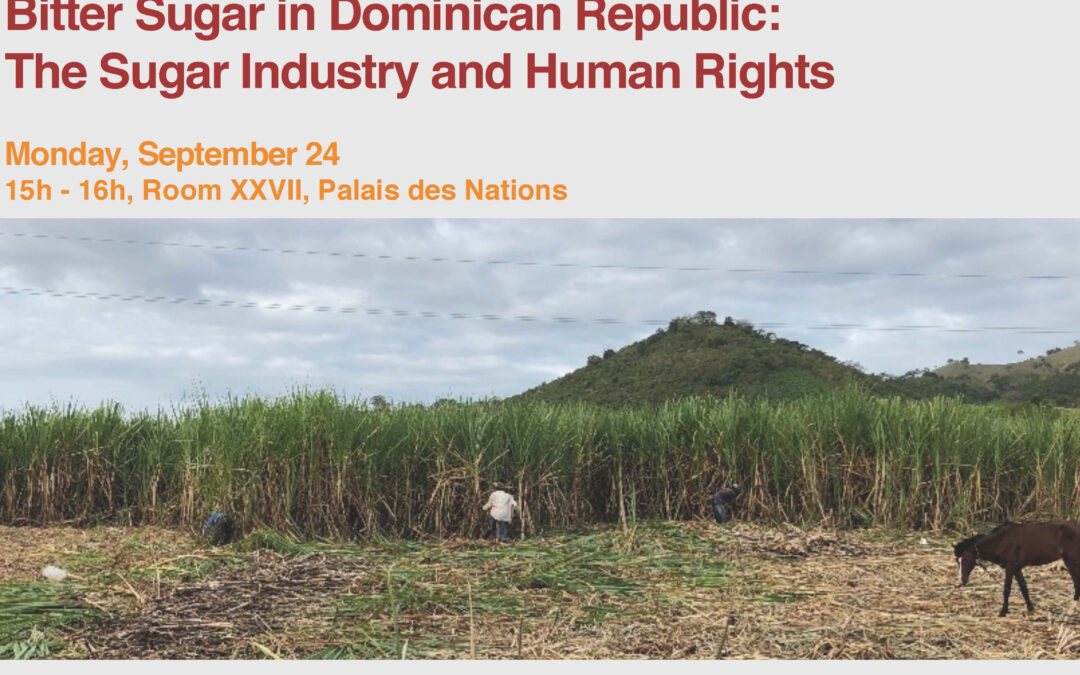
Sep 19, 2018 | Events, News
The ICJ will host the side event, “Bitter Sugar in Dominican Republic: The Sugar Industry and Human Rights” on Monday, 24 September 2018 from 15:00-16:00, Room XXVII, at the Palais de Nations in Geneva.
Together with tourism, sugar production is one of the major industries and one of the biggest sources of employment in the Dominican Republic.
This small Caribbean State remains one of the world’s top sugar suppliers to the USA.
While sugar production and export in the Dominican Republic is a major source of income for the country, the adverse impacts of its production are various.
Destruction of the environment, reduced access to land for local communities, forced evictions and precarious working conditions in sugarcane plantations are unfortunately a reality in many regions of this Caribbean State.
Whilst the Dominican Republic has shown in past years a preparedness to abide by and implement international standards on matters related to business and human rights, the country continues to face many challenges and evidence of human rights violations on the ground still portrays a complicated reality.
Two recent examples involving the sugar cane industry illustrate ongoing concern about human rights abuses in the Dominican Republic.
In 2016, armed agents of one of the largest sugar producers in the country, Central Romana Corporation, forcibly evicted from their homes more than 60 families during the night.
No alternative accommodation or reparations have been provided to the victims to redress the destruction of their homes and the trauma caused by the violence of the evictions.
In 2017, the Vicini Group, the second main sugar producing company in the country, used the pesticide Glyphosate in such a way that many were in danger of death and that it destroyed the crops of peasant farmers and workers.
To date, the human rights violations in both cases continue to be unpunished.
There is a growing international concern that the sugar cane industry in the Dominican Republic is somehow able to act with impunity when it comes to human rights violations.
Bearing in mind the upcoming Universal Periodic Review of Dominican Republic, in which all UN Member States will examine the human rights situation in the country, this side event is aimed at informing and shedding light on this little known reality in the Dominican Republic as well as to brief State delegations about the importance of addressing this issue in their review of the Dominican Republic.
The event will also provide a space for constructive dialogue among various actors, including the Government of the Dominican Republic.
Panelists:
– Carlos Lopez, Senior Legal Adviser, International Commission of Jurists
– Fr. Damián Calvo Martin OP, Director, Centro de Teología Santo Domingo de Guzman
– María Magdalena Álvarez Gálvez, victim of forced evictions by Central Romana Corp.
Moderator: Rory Gogarty, High Court of England and Wales
Interpretation: Will be provided from English to Spanish and Spanish to English
Dominican Republic Sugar Industry Side Event Flyer 24 Sept. (flyer of the event in pdf)
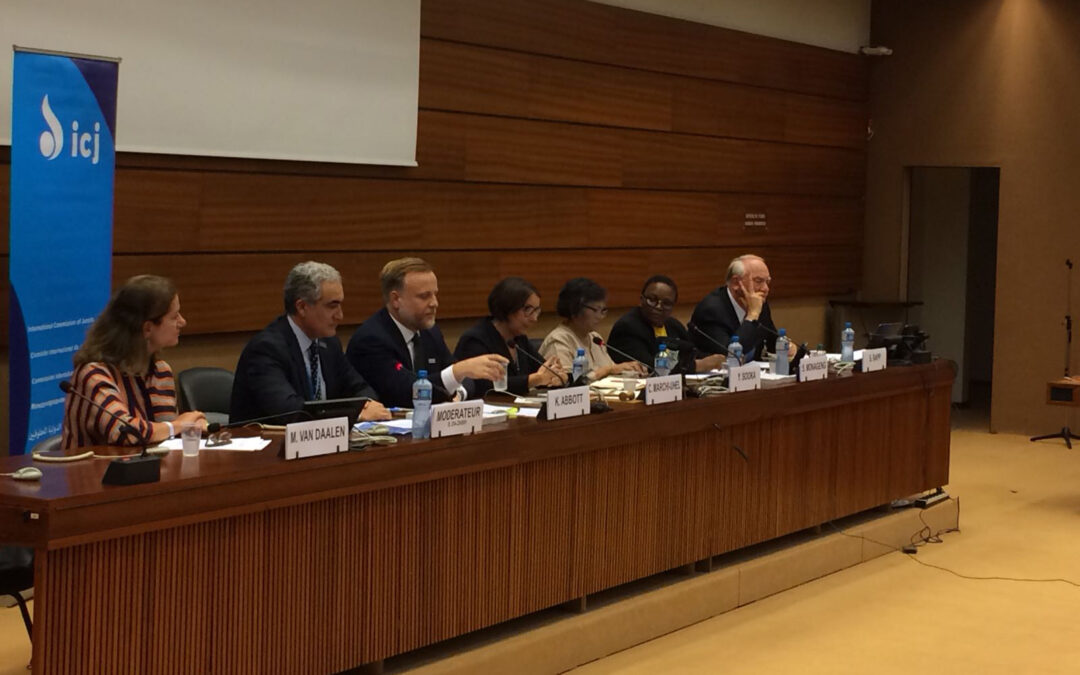
Sep 18, 2018 | Événements, Multimédia, Nouvelles
La CIJ a organisé cet événement parallèle aujourd’hui (mardi 18 septembre 2018) au Conseil des droits de l’Homme, en coopération avec la Mission permanente des Pays-Bas.
https://www.facebook.com/ridhglobal/videos/1005764152964172/
Contexte
En particulier lorsque des crimes de droit international sont perpétrés à grande échelle dans des situations de crise, il est urgent de préserver les preuves pouvant être utilisées lors de procédures pénales éventuelles, que ce soit devant la Cour pénale internationale ou d’autres tribunaux nationaux ou internationaux.
Trop fréquemment, des obstacles empêchent un recours direct aux tribunaux et procureurs internationaux. L’une des réponses a été la création de mécanismes pour collecter et conserver les preuves pendant ce temps. Les exemples incluent le Mécanisme international indépendant et impartial (IIIM) pour la Syrie et la Commission des droits de l’Homme au Sud Soudan.
À la présente session du Conseil des droits de l’Homme, la mission d’enquête sur le Myanmar a appelé à la création d’un IIIM dans l’attente d’une saisine de la CPI ou d’un tribunal ad hoc.
Discours d’ouverture
Ambassadeur Monique T.G. van Daalen, Mission permanente des Pays-Bas
Modérateur:
Saman Zia-Zarifi, Secrétaire général de la Commission internationale des juristes
Panélistes:
- Catherine Marchi-Uhel, cheffe du Mécanisme international indépendant et impartial (IIIM) pour la Syrie
- Yasmin Sooka, présidente de la Commission des droits de l’homme au Sud Soudan
- Sanji Monageng, ancienne juge / vice-présidente de la CPI et commissaire de la CIJ
- Stephen Rapp, président de la Commission pour la justice internationale et la responsabilité (CIJA), membre émérite du US Holocaust Memorial Museum, et ancien ambassadeur des États-Unis chargé pour la justice pénale mondiale
- Kingsley Abbott, conseiller juridique principal de la CIJ, anciennement aux Chambres Extraordinaires au sein des Tribunaux Cambodgiens et du Tribunal spécial pour le Liban
Universal-ICJ-NL-Side event-News-events-2018-ENG (prospectus de l’événement en PDF uniquement en anglais)
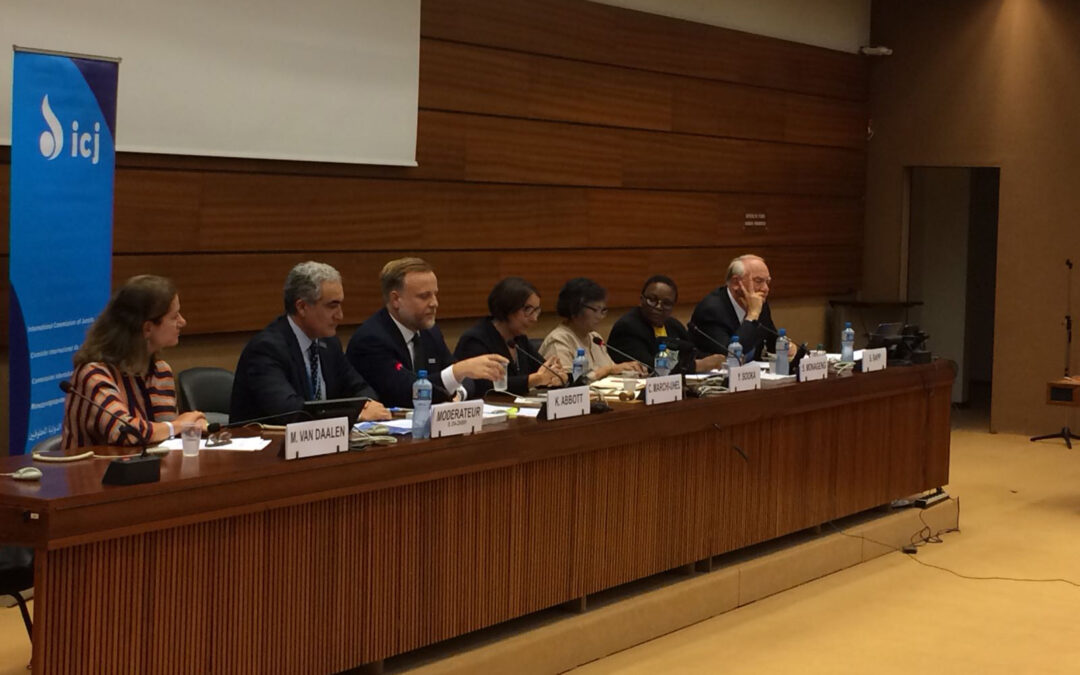
Sep 18, 2018 | Events, Multimedia items, News, Video clips
The ICJ organized this side event today (Tuesday 18 September 2018), in cooperation with the Permanent Mission of the Netherlands, at the Human Rights Council.
https://www.facebook.com/ridhglobal/videos/1005764152964172/
Background
Particularly when crimes under international law are perpetrated on a large scale in situations of crisis, there is an urgent need to preserve evidence for use in eventual criminal proceedings, whether at the International Criminal Court or other national or international tribunals
Too frequently, obstacles prevent immediate direct recourse to international courts and prosecutors. One response has been the creation of mechanisms to collect and preserve the evidence in the meantime. Examples include the International Independent and Impartial Mechanism (IIIM) for Syria, and the Commission on Human Rights in South Sudan.
At the current session of the Human Rights Council, the Fact-Finding Mission on Myanmar has called for establishment of an IIIM pending referral to the ICC or an ad hoc tribunal.
Opening Remarks:
Ambassador Monique T.G. van Daalen, Permanent Mission of the Netherlands
Moderator:
Saman Zia-Zarifi, Secretary General, International Commission of Jurists
Panelists:
- Catherine Marchi-Uhel, Head, International, Impartial and Independent Mechanism (IIIM) for Syria
- Yasmin Sooka, Chairperson, Commission on Human Rights in South Sudan
- Sanji Monageng, former Judge/Vice-President of the ICC, and Commissioner of the ICJ
- Stephen Rapp, Chair, Commission for International Justice & Accountability (CIJA), Distinguished Fellow, US Holocaust Memorial Museum, and former United States Ambassador-at-Large for Global Criminal Justice
- Kingsley Abbott, ICJ Senior Legal Adviser (Global Accountability), formerly with the Extraordinary Chambers in the Courts of Cambodia and the Special Tribunal for Lebanon
Universal-ICJ-NL-Side event-News-events-2018-ENG (flyer of the event in PDF)
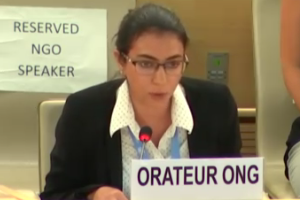
Sep 18, 2018 | Plaidoyer
La CIJ a mis en lumière les graves menaces qui pèsent sur l’état de droit en Hongrie, en Pologne et en Turquie, lors de sa prise de parole au Conseil des droits de l’Homme à Genève.
La déclaration, faite pendant le débat général sur les situations nécessitant l’attention du Conseil, est la suivante:
«La Commission internationale de juristes (CIJ) voudrait attirer l’attention du Conseil sur les graves menaces qui pèsent sur l’état de droit en Hongrie, en Pologne et en Turquie.
En Pologne, le gouvernement a adopté une mesure législative pour imposer de manière arbitraire un «départ à la retraite» involontaire d’un tiers de ses juges à la Cour suprême, portant ainsi un coup fatal à l’indépendance du pouvoir judiciaire, déjà mis à mal par les réformes passées.
En Hongrie, de multiples réformes législatives ont affaibli l’indépendance des juges et puni les activités de certaines ONG de défense des droits de l’homme et restreint leur financement.
Enfin, en Turquie, la consolidation de mesures d’urgence en droit commun, des réformes constitutionnelles régressives, et le licenciements massif de juges et de procureurs a supprimé une protection essentielle pour le fonctionnement d’un pouvoir judiciaire indépendant.
La CIJ est en outre préoccupée par l’interdiction des manifestations des mères du samedi qui prévoit d’organiser des manifestations hebdomadaires à la mémoire des membres de leur famille disparus, en violation de leur droit à la liberté de réunion.
La CIJ est profondément préoccupée par l’escalade de telles menaces aux principes fondamentaux de l’état de droit en Europe, sans que des mesures spécifiques soient prises par le Conseil pour y remédier.
La CIJ exhorte le Conseil à prêter attention à ces développements, qui s’inscrivent dans le cadre d’une attaque mondiale plus vaste contre la primauté du droit [1] et à observer la situation des droits de l’homme dans ces pays.
[1] Voir la CIJ, «L’état de droit sous la menace mondiale» (déclaration lors du débat général sur le compte rendu oral du Haut Commissaire), 11 septembre 2018: https://www.icj.org/hrc39-gd2-hc/
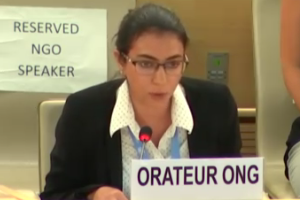
Sep 18, 2018 | Advocacy, Non-legal submissions
The ICJ today put the spotlight on serious threats to the rule of law in Hungary, Poland and Turkey, speaking at the UN Human Rights Council in Geneva.The statement, made during general debate on situations that require the Council’s attention, read as follows:
“The International Commission of Jurists (ICJ) would like to bring to the Council’s attention the serious threats to the rule of law in Hungary, Poland and Turkey.
In Poland, the Government has adopted legislation to arbitrarily force into involuntary “retirement” one third of its Supreme Court Justices, delivering a fatal blow to the independence of the judiciary, already strained by past reforms.
In Hungary, multiple legal reforms have weakened judicial independence and effectively criminalized the activities of certain human rights NGOs and curtailed their financing.
Finally, in Turkey, consolidation of emergency measures in ordinary law, regressive constitutional reforms, and the mass dismissal of judges and prosecutors have removed essential protection for the independent functioning of the judiciary.
The ICJ is further concerned by the protest ban against the Saturday Mothers to hold weekly protests in memory of their disappeared family members, in breach of their right to freedom of assembly.
The ICJ is alarmed at the escalation of such threats to the very basic tenets of the rule of law in Europe, without specific action being taken by this Council to address them.
The ICJ urges the Council to give attention to these developments, which indeed form part of a broader global attack on the rule of law,[1] and to keep under observation the human rights situation in these countries.”
[1] See ICJ, “The Rule of Law under Global Threat” (statement in general debate on the oral update of the High Commissioner), 11 September 2018: https://www.icj.org/hrc39-gd2-hc/









